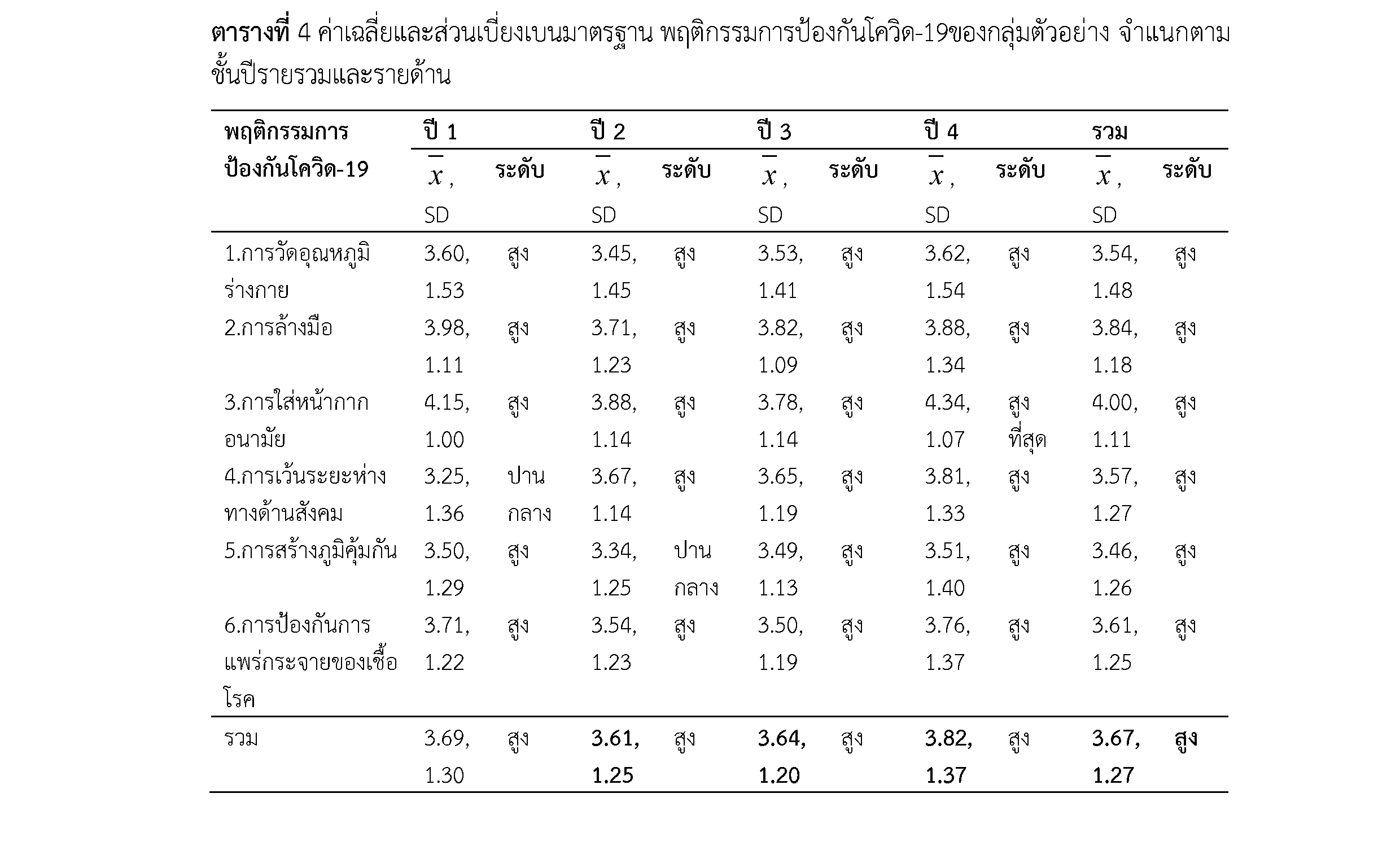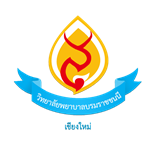Knowledge and Preventive Behaviors Towards the Covid-19 among Nursing Students in Boromarajonani College of Nursing, Chiang Mai
Keywords:
Knowledge, Preventive Behaviors, Covid-19, Nursing StudentsAbstract
The purpose of this descriptive study was to examine knowledge and preventive behaviors towards the Covid-19 among nursing students in Boromarajonani College of Nursing, Chiang Mai. A sample of 245 nursing students was recruited by random sampling from all nursing students. The research instruments were the Covid-19 knowledge questionnaire and the preventive behaviors questionnaire. The reliability of the Covid-19 knowledge questionnaire with KR-20 coefficient was 0.85. The reliability of the Covid-19 preventive behavior questionnaire with Cronbach's alpha coefficient was 0.85. Data were analyzed using descriptive statistics: frequencies, percentages, mean, and standard deviation.
The results showed that 57.15% of all participants had a high level of Covid-19 knowledge. 58.77% of all participants a high level of Covid-19 preventive behaviors. The highest mean score of preventive behaviors was wearing a face mask. (=4.00, SD=1.11). This research indicated that the administration of the college could apply this findings to provide the activities for promoting knowledge and preventive behaviors toward Covid-19 among nursing students.
References
กรมอนามัย กระทรวงสาธารณสุข. (2563). แนวปฏิบัติสำหรับสถานศึกษาในการป้องกันการแพร่ระบาดของโรคโควิด 19 ประเทศไทย. สืบค้น 1 ธันวาคม 2564 , จากhttps://covid19.anamai.moph.go.th/th/establishments/ Sys_Page=2&Sys_OrderBy=news&Sys_ASCDESC=ASC.
กรมควบคุมโรค กระทรวงสาธารณสุข. (2563). โรคติดเชื้อไวรัสโคโรนา 2019 Coronavirus Disease 2019 (COVID-19). สืบค้น 18 มิถุนายน 2563, จาก https://ddc.moph.go.th/viralpneumonia/file/g_km/handout001_12032020.pdf.
คณะกรรมการโรคติดต่อจังหวัดเชียงใหม่. (2564). สถานการณ์โควิด-19 จังหวัดเชียงใหม่ วันที่ 13 ตุลาคม 2564. สืบค้นวันที่ 15 ตุลาคม 2564 จาก, http://www.chiangmai.go.th/covid19/assets/img/situation/131064.jpg.
จารุวรรณ แหลมไธสง. (2559). ปัจจัยทำนายพฤติกรรมการป้องกันโรคติดเชื้อทางเดินหายใจของผู้ดูแลเด็กปฐมวัยในศูนย์เด็กเล็ก กรุงเทพมหานคร. สาขาวิชาการพยาบาลเวชปฏิบัติชุมชนคณะพยาบาลศาสตร์, มหาวิทยาลัยบูรพา.
ธานี ชัยวัฒน์, จารุวัฒน์ เอมช์บุตร, นิชาภัทร ไม้งาม,ปกรณ์สิทธิ์ ฐานา, ณัฏฐ์ศุภณ ดำชื่นและชนลักษณ์ ชัยศรีลักษณ์. (2563). Behavioral insights ของครัวเรือนไทยภายใต้สถานการณ์ COVID-19. สืบค้น 19 กรกฎาคม 2563, จาก https://drive.google.com/file/d/1s-tvSan9LHnDW bfbs4 t8vIeqWAJw4ekj/view fbclid=IwAR25gHVW5Q1sy6DmgOUU33 QsxJq Het svyLzdJ1kO86I4N2pqho5nRWNfhUM.
เฉลิมพล แจ่มจันทร์. (2563). วัยรุ่นและเยาวชน กับสื่อสังคมออนไลน์. สืบค้น 19 กรกฎาคม 2563, จาก https://www.thaihealthreport.com/article-july03-2020.
บุรฉัตร จันทร์แดง, เสาวลักษณ์ โกศลกิตติอัมพร และสัญญา เคณาภูมิ. (2562). ปัจจัยที่มีผลต่อการเปลี่ยนแปลงพฤติกรรม. วารสารวิชาการธรรมทรรศน์,19(4), 235-244.
Al-Hanawi, M. K., Angawi , K., Alshareef , N., Qattan, A. MN., Helm H. Z., Abudawood,Y., et al. (2020). Knowledge, attitude and practice toward COVID-19 among the public in the Kingdom of Saudi Arabia: A cross-sectional study. Retrieved from https://www.frontiersin.org/articles/10.3389/fpubh.2020.00217/full.
Department of Disease Control. (2021). Corona virus disease (COVID-19): Thailand situation. Retrived from: https://ddc.moph.go.th/viralpneumonia/.
Gallè, F., Sabella, E. A., Molin, G. D., Giglio, O. D., Caggiano, G., & Valeria Di Onofrio, V. D. (2020). Understanding knowledge and behaviors related to CoViD–19 epidemic in Italian undergraduate students: The EPICO Study. Retrived from https://www.mdpi.com/1660-4601/17/10/3481.
He, J, Guo, Y, Mao, R, & Zhang, J. (2021). Proportion of asymptomatic coronavirus disease 2019: A systematic review and meta-analysis. Journal of Medical Virology, 93, 820– 830. https://doi.org/10.1002/jmv.26326 .
Huang, C., et al.(2020). Clinical features of patients infected with 2019 novel coronavirus in Wuhan, China.The Lancet, 395(10223), 497-506. DOI: https://doi.org/10.1016/S0140-6736(20)30183-5.
Inthacharoen, A., Kanchanapoom, K., Tansakul,K.,& Pattapat, S. (2021). Factors influencing preventive behavior towards coronavirus disease 2019 among people in Khohong Town Municipality Songkhla province. Journal of Council of Community Public Health, 3(2), 14-25. In Thai.
Kaewsuksai,R., Kongkun,P., Tongkoop,B., Samaair,L.,& Boonnarakorn,S. (2021). Relationships between knowledge, perception, and the "New Normal Behaviors" for preventing coronavirus disease (COVID-19) Infection among people in Narathiwat Province. The Southern College Network Journal of Nursing and Public Health, 8(2), 67-79. In Thai.
Kasemsuk,K.& Boonbunjob,U. (2018). Health promotion of early adulthood development: Nurses’ important role. Royal Thai Air Force Medical Gazette, 64(3), 101-107. in Thai.
LameShow,S., Hosme, D.W., Kler, J., & Lwanga,S.K. (1990). Adequacy of sample size in health studies. New York: John Wiley & Sons.
Puengching,T.& Punthasri, P. (2019). Factors related to prevention behavior for communicable disease in the air technical students. Royal Thai Air Force Medical Gazette, 65(3), 1-11. In Thai.
Rathachatranon, W. (2019). Determining an appropriate sample size for social science research:The myth of using Taro Yamane and Krejcie & Morgan method. Kasetsart University Political Science Review Journal (KUPSRJ), 6(1),27-58. in Thai.
Singhal T. (2020). A review of coronavirus disease-2019 (COVID-19). Indian journal of pediatrics, 87(4), 281–286. https://doi.org/10.1007/s12098-020-03263-6.
Struyf, T, et al. (2020). Signs and symptoms to determine if a patient presenting in primary care or hospital outpatient settings has COVID-19 disease. Cochrane Database of Systematic Reviews 2020, Issue 7. Art. No.: CD013665. DOI: 10.1002/14651858.CD013665. Accessed 17 October 2021.
Tian, S., et al. (2020). Characteristics of COVID-19 infection in Beijing. Journal of infection, 80(4), 401–406.

Downloads
Published
How to Cite
Issue
Section
License
1. บทความหรือข้อคิดเห็นใด ๆ ที่ปรากฏในวารสารวิจัยการพยาบาลและการสาธารณสุข ที่เป็นวรรณกรรมของผู้เขียน บรรณาธิการไม่จำเป็นต้องเห็นด้วย
2. บทความที่ได้รับการตีพิมพ์ถือเป็นลิขสิทธิ์ของ วารสารวิจัยการพยาบาลและการสาธารณสุข








